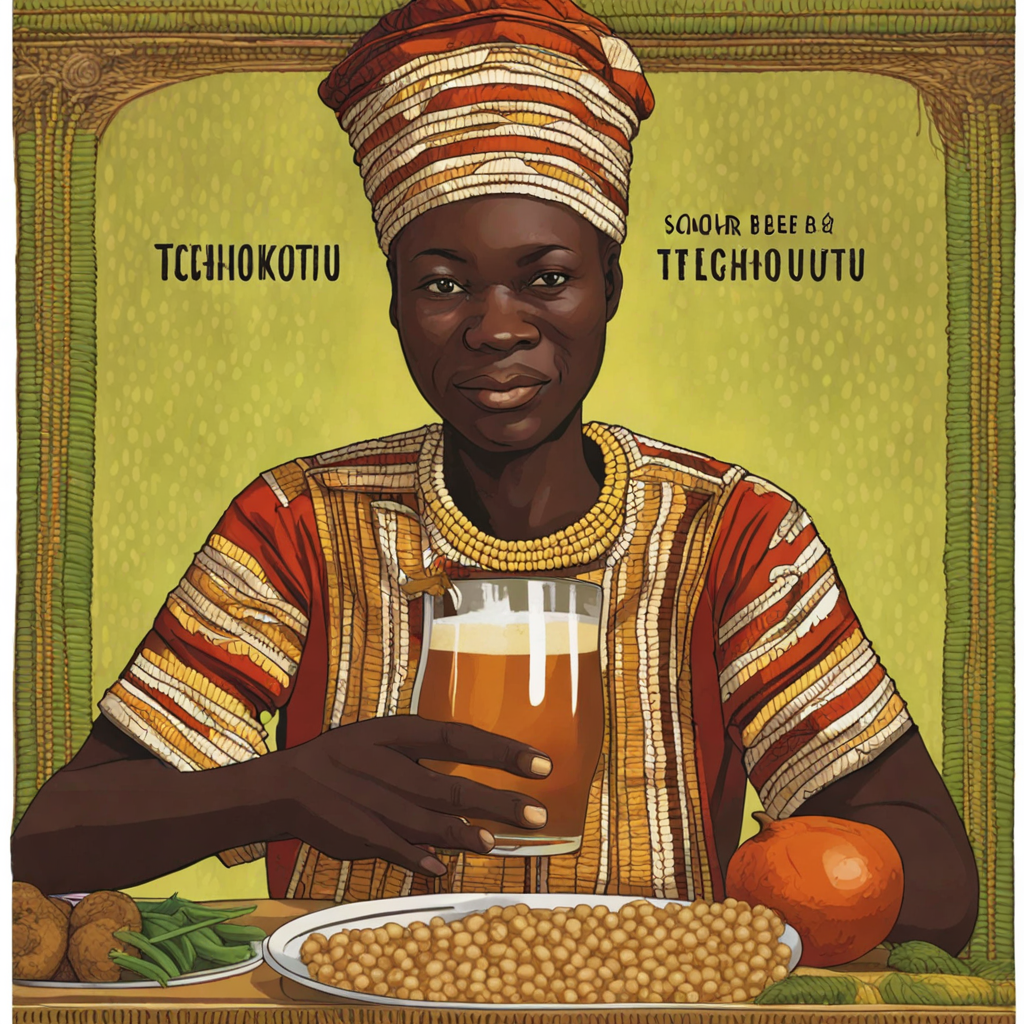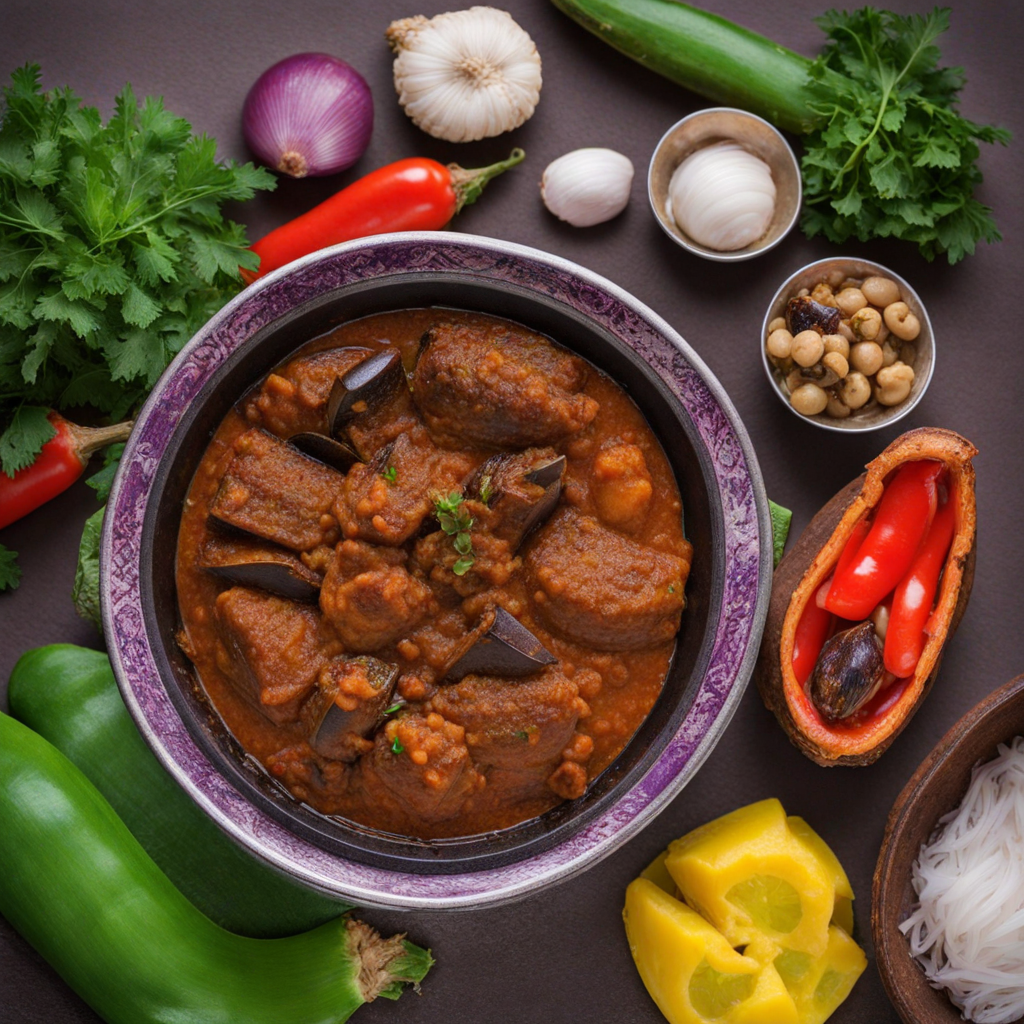Tchoukoutou
Tchoukoutou is a traditional alcoholic beverage from Benin, often referred to as the country’s version of local beer. This drink is made from fermented millet or sorghum, which gives it a distinct earthy flavor that is both refreshing and slightly tangy. The grains are first soaked in water, then ground and mixed with additional water to create a mash, which is left to ferment naturally. The fermentation process can take a few days, resulting in a slightly cloudy liquid that is rich in probiotics and has a unique, complex taste profile that varies depending on the ingredients and methods used by different brewers. In terms of aroma, Tchoukoutou has a fragrant, fruity scent that beckons enthusiasts to take a sip. The first taste is often surprising; it starts off with a mild sweetness reminiscent of ripe fruits, followed by a subtle sourness that balances out the sweetness. The mouthfeel can be described as creamy, with a slight grainy texture that is characteristic of drinks made from whole grains. It is typically served in calabashes or traditional clay pots, enhancing the rustic experience that accompanies its consumption. Tchoukoutou is not just a drink; it embodies the communal spirit of Benin. It is often enjoyed during social gatherings, celebrations, and rituals, making it a significant part of the cultural fabric. The beverage is often accompanied by traditional snacks or meals, making it a versatile drink that complements various flavors. Discovering Tchoukoutou opens the door to understanding the rich heritage of Benin and invites you to partake in the joyous moments shared over this unique brew.
How It Became This Dish
The History of Tchoukoutou: A Cultural Elixir from Benin Tchoukoutou, a traditional alcoholic beverage from Benin, is more than just a drink; it is a profound symbol of the cultural and social fabric of the nation. This potent brew, often referred to as "sorghum beer," has a rich history that intertwines with the region's agricultural practices, social customs, and communal life. To appreciate Tchoukoutou fully, one must explore its origins, its cultural significance, and its evolution through the ages. #### Origins of Tchoukoutou Tchoukoutou finds its roots in the agricultural practices of the West African region, where sorghum and millet have been staple crops for centuries. The history of sorghum cultivation in Africa can be traced back to around 3000 BC, making it one of the continent's oldest cultivated grains. In Benin, sorghum is particularly valued for its resilience to drought and its ability to thrive in poor soil conditions, making it an essential crop for local communities. The production of Tchoukoutou typically begins with the harvesting of sorghum, which is then processed into a mash. The fermentation process, which involves the addition of water and sometimes other ingredients like maize or millet, is crucial in transforming the starches into sugars, which yeast can later convert into alcohol. This fermentation occurs naturally, often aided by the indigenous yeasts present in the environment. It is believed that the techniques for brewing Tchoukoutou were passed down through generations, with each community adding its unique twist to the process. The drink's name varies across different ethnic groups in Benin, demonstrating its widespread appeal and regional adaptations. #### Cultural Significance Tchoukoutou is deeply embedded in the social and cultural rites of the Beninese people. It is often consumed during important ceremonies and celebrations, such as weddings, funerals, and religious festivals. The drink serves as a communal bonding agent, bringing people together to share stories, laughter, and a sense of belonging. In many communities, Tchoukoutou is traditionally brewed by women, who play a vital role in its production and the social rituals surrounding it. Women often gather in groups to prepare the drink, fostering a sense of camaraderie and cooperation. This communal brewing process is not just about creating a beverage; it is a time for storytelling, passing down traditions, and reinforcing social ties. The importance of Tchoukoutou extends to its role in hospitality. Offering Tchoukoutou to guests is seen as an act of goodwill and respect. It is common for hosts to present the drink in calabashes, and sharing it signifies friendship and unity. The beverage is often accompanied by traditional snacks, further enhancing the communal experience. Moreover, Tchoukoutou has spiritual significance in many communities. Some believe that the drink has protective qualities, and it is often used in rituals to honor ancestral spirits or seek blessings. In this context, Tchoukoutou transcends mere consumption; it becomes a conduit for cultural expression and spiritual connection. #### Development Over Time The evolution of Tchoukoutou over the years has been influenced by various factors, including colonialism, globalization, and changing social dynamics. During the colonial period, the introduction of new agricultural practices and crops altered traditional brewing methods. While sorghum remained a key ingredient, other grains and additives began to emerge, diversifying the flavor profiles of Tchoukoutou. The post-colonial era witnessed a resurgence of interest in traditional practices, as communities sought to reclaim their cultural heritage. This movement led to a renewed appreciation for Tchoukoutou, with many young people embarking on projects to document and preserve traditional brewing techniques. Workshops and festivals celebrating Tchoukoutou have become increasingly popular, serving as platforms for education and cultural exchange. In recent years, globalization has brought new challenges and opportunities for Tchoukoutou. As Western influences permeate the region, traditional beverages face competition from commercially produced drinks. However, this has also opened avenues for marketing Tchoukoutou beyond local boundaries. Entrepreneurs and community advocates are now exploring ways to promote Tchoukoutou as a unique cultural product, aiming to attract tourists and food enthusiasts alike. Despite these changes, the essence of Tchoukoutou remains intact. The drink continues to be a symbol of resilience and adaptability, reflecting the spirit of the Beninese people. Each sip tells a story of history, community, and cultural pride, reminding drinkers of their roots and collective identity. #### Tchoukoutou in the Contemporary Context Today, Tchoukoutou is experiencing a renaissance, as a new generation seeks to embrace and innovate upon traditional practices. Young brewers are experimenting with flavors, incorporating local fruits and herbs to create unique variations of the beverage. This creative approach has led to a burgeoning craft brewing scene, where Tchoukoutou is celebrated as a distinct artisanal product. Moreover, the global interest in craft beverages has positioned Tchoukoutou as a potential contender on the international stage. Efforts are underway to create standards for quality and branding, which could enhance its visibility and prestige. Initiatives to promote sustainable farming practices and local sourcing further align Tchoukoutou with contemporary values of environmental consciousness and social responsibility. In the realm of tourism, Tchoukoutou has become a focal point for cultural experiences. Many tour operators now include traditional brewing workshops and tastings in their itineraries, allowing visitors to engage directly with local communities. This not only generates income for local artisans but also fosters cross-cultural understanding and appreciation. #### Conclusion Tchoukoutou is more than a beverage; it is a living testament to the rich cultural history of Benin. Its origins in ancient agricultural practices, combined with its significant role in social and spiritual life, underscore its importance in the identity of the Beninese people. As Tchoukoutou continues to evolve in the face of modern challenges and opportunities, it remains a cherished artifact of cultural heritage, a drink that celebrates community, tradition, and the remarkable resilience of a people deeply connected to their land and history.
You may like
Discover local flavors from Benin







